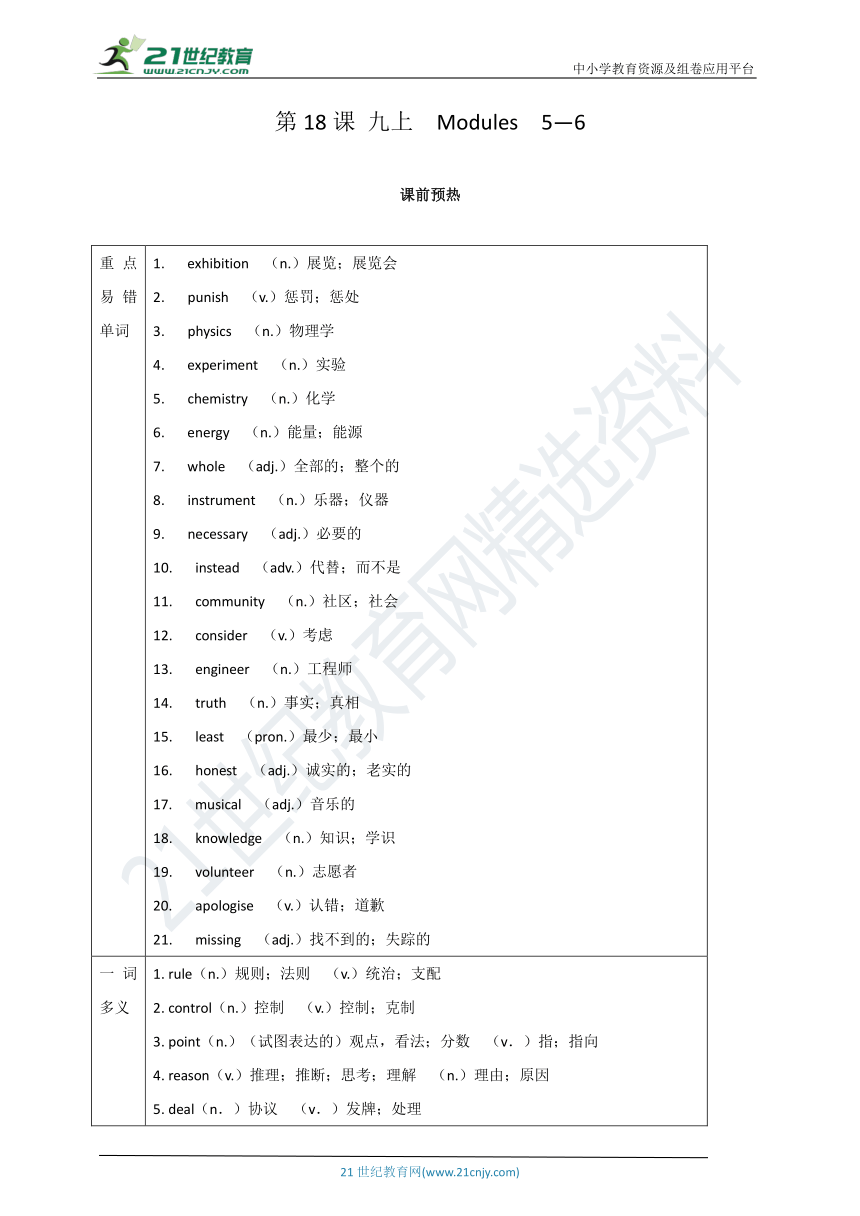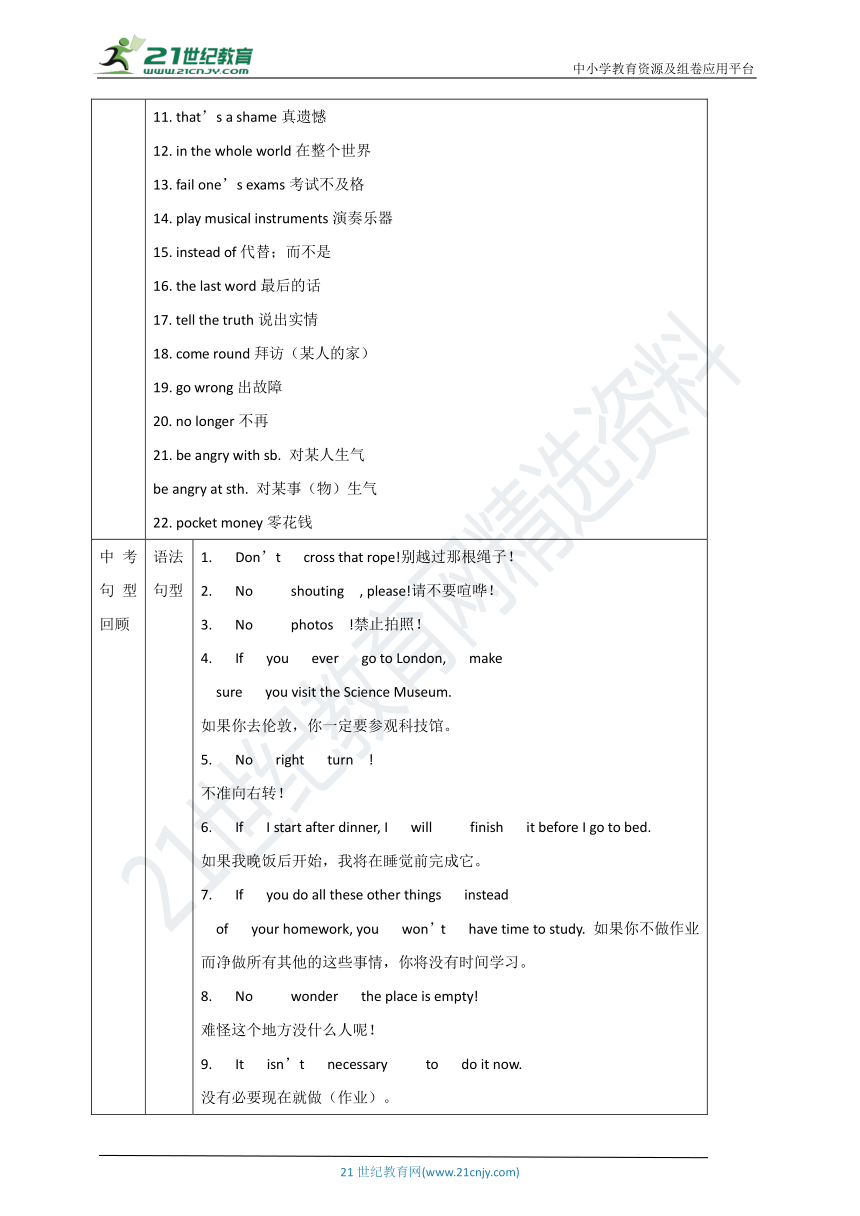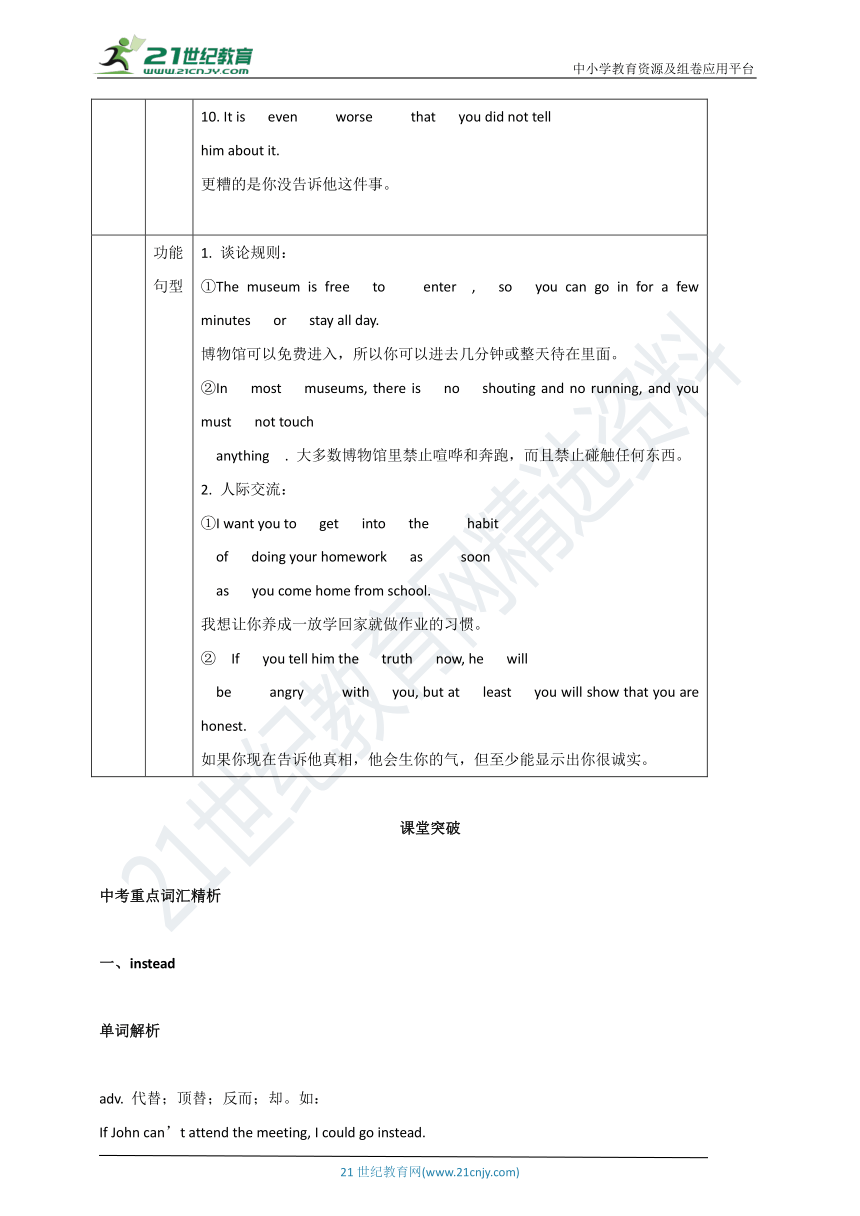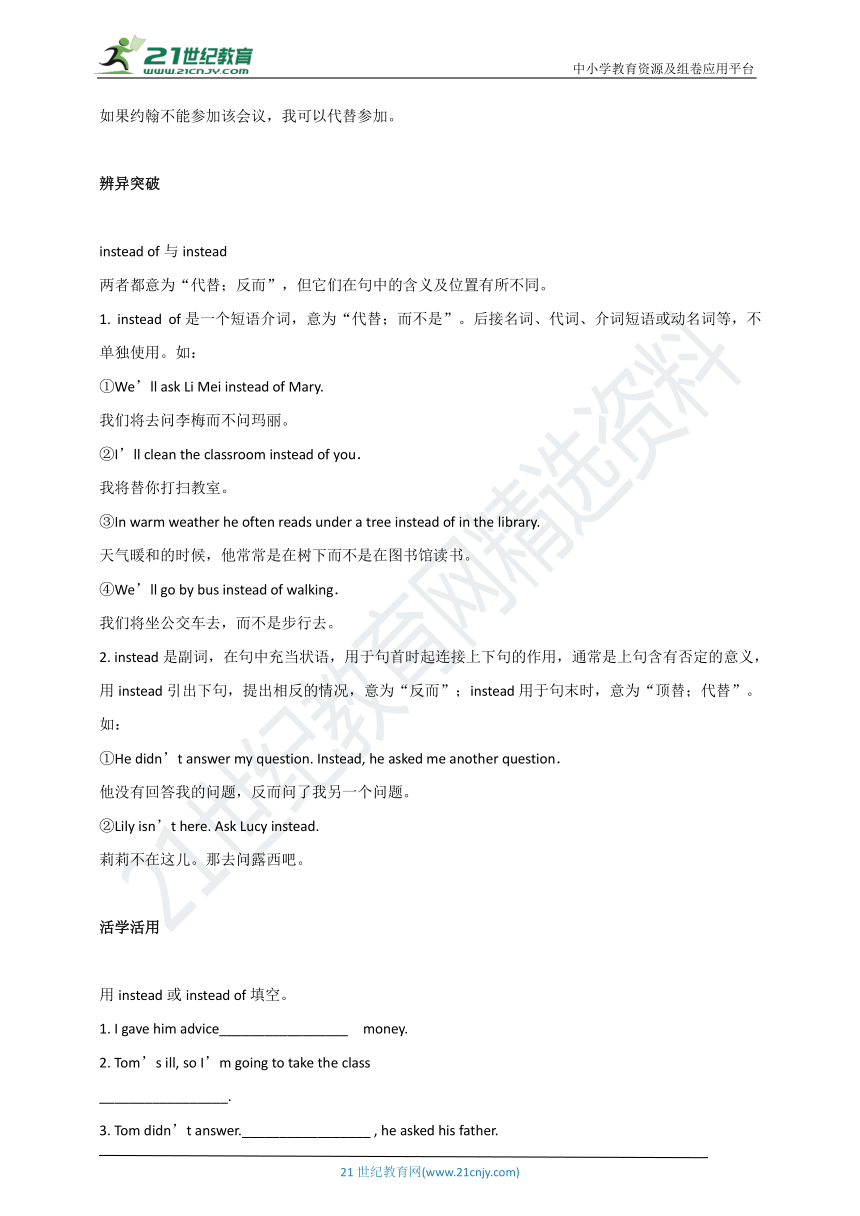外研版英语中考语言基础知识梳理与训练 第18课九年级上册 Modules 5—6
文档属性
| 名称 | 外研版英语中考语言基础知识梳理与训练 第18课九年级上册 Modules 5—6 |  | |
| 格式 | doc | ||
| 文件大小 | 1.3MB | ||
| 资源类型 | 试卷 | ||
| 版本资源 | 外研版 | ||
| 科目 | 英语 | ||
| 更新时间 | 2022-02-06 19:10:20 | ||
图片预览





文档简介
中小学教育资源及组卷应用平台
第18课 九上 Modules 5—6
课前预热
重点易错单词 1. exhibition (n.)展览;展览会2. punish (v.)惩罚;惩处3. physics (n.)物理学4. experiment (n.)实验5. chemistry (n.)化学6. energy (n.)能量;能源7. whole (adj.)全部的;整个的8. instrument (n.)乐器;仪器9. necessary (adj.)必要的10. instead (adv.)代替;而不是11. community (n.)社区;社会12. consider (v.)考虑13. engineer (n.)工程师14. truth (n.)事实;真相15. least (pron.)最少;最小16. honest (adj.)诚实的;老实的17. musical (adj.)音乐的18. knowledge (n.)知识;学识19. volunteer (n.)志愿者20. apologise (v.)认错;道歉21. missing (adj.)找不到的;失踪的
一词多义 1. rule(n.)规则;法则 (v.)统治;支配2. control(n.)控制 (v.)控制;克制3. point(n.)(试图表达的)观点,看法;分数 (v.)指;指向4. reason(v.)推理;推断;思考;理解 (n.)理由;原因5. deal(n.)协议 (v.)发牌;处理
词形变换 1. upstairs(adj.)→ downstairs (反义词)位于楼下的2. rule(n.)→ ruler (n.)尺子3. enter(v.)→ entry (n.)进入权4. communicate(v.)→ communications (n.)(pl.)通信5. hunger(n.)→ hungry (adj.)饥饿的6. exam(n.)→ test (近义词)测验7. community(n.)→ communities (pl.)社区;社会8. angry(adj.)→ anger (n.)愤怒;生气→ angrily (adv.)生气地;愤怒地→ angrier (比较级)更生气的→ angriest (最高级)最生气的9. true(adj.)→ truth (n.)真相→ truly (adv.)真正地;确实10. immediate(adj.)→ immediately (adv.)立刻;马上11. late(adj.)→ later (adv.)之后;后来→ later (比较级)更迟的→ latest (最高级)最迟的12. last(adj.)→ first (反义词)最初的;最早的13. same(adj.)→ different (反义词)不同的
中考词组短语 1. against the rules违反规定2. in trouble遇上麻烦3. no entry禁止入内4. no wonder难怪5. go downstairs下楼6. fill... with... 用……装满……7. be filled with装满8. compare... with... 比较……与……9. learn about得知;获悉10. get into the habit of... 养成……的习惯11. that’s a shame真遗憾 12. in the whole world在整个世界13. fail one’s exams考试不及格14. play musical instruments演奏乐器15. instead of代替;而不是16. the last word最后的话17. tell the truth说出实情e round拜访(某人的家)19. go wrong出故障20. no longer不再21. be angry with sb. 对某人生气be angry at sth. 对某事(物)生气22. pocket money零花钱
中考句型回顾 语法句型 1. Don’t cross that rope!别越过那根绳子!2. No shouting , please!请不要喧哗!3. No photos !禁止拍照!4. If you ever go to London, make sure you visit the Science Museum. 如果你去伦敦,你一定要参观科技馆。5. No right turn !不准向右转!6. If I start after dinner, I will finish it before I go to bed.如果我晚饭后开始,我将在睡觉前完成它。7. If you do all these other things instead of your homework, you won’t have time to study. 如果你不做作业而净做所有其他的这些事情,你将没有时间学习。8. No wonder the place is empty!难怪这个地方没什么人呢!9. It isn’t necessary to do it now. 没有必要现在就做(作业)。10. It is even worse that you did not tellhim about it.更糟的是你没告诉他这件事。
功能句型 1. 谈论规则:①The museum is free to enter , so you can go in for a few minutes or stay all day.博物馆可以免费进入,所以你可以进去几分钟或整天待在里面。②In most museums, there is no shouting and no running, and you must not touch anything . 大多数博物馆里禁止喧哗和奔跑,而且禁止碰触任何东西。2. 人际交流:①I want you to get into the habit of doing your homework as soon as you come home from school. 我想让你养成一放学回家就做作业的习惯。② If you tell him the truth now, he will be angry with you, but at least you will show that you are honest.如果你现在告诉他真相,他会生你的气,但至少能显示出你很诚实。
课堂突破
中考重点词汇精析
一、instead
单词解析
adv. 代替;顶替;反而;却。如:
If John can’t attend the meeting, I could go instead.
如果约翰不能参加该会议,我可以代替参加。
辨异突破
instead of与instead
两者都意为“代替;反而”,但它们在句中的含义及位置有所不同。
1. instead of是一个短语介词,意为“代替;而不是”。后接名词、代词、介词短语或动名词等,不单独使用。如:
①We’ll ask Li Mei instead of Mary.
我们将去问李梅而不问玛丽。
②I’ll clean the classroom instead of you.
我将替你打扫教室。
③In warm weather he often reads under a tree instead of in the library.
天气暖和的时候,他常常是在树下而不是在图书馆读书。
④We’ll go by bus instead of walking.
我们将坐公交车去,而不是步行去。
2. instead是副词,在句中充当状语,用于句首时起连接上下句的作用,通常是上句含有否定的意义,用instead引出下句,提出相反的情况,意为“反而”;instead用于句末时,意为“顶替;代替”。如:
①He didn’t answer my question. Instead, he asked me another question.
他没有回答我的问题,反而问了我另一个问题。
②Lily isn’t here. Ask Lucy instead.
莉莉不在这儿。那去问露西吧。
活学活用
用instead或instead of填空。
1. I gave him advice_________________ money.
2. Tom’s ill, so I’m going to take the class
_________________.
3. Tom didn’t answer._________________ , he asked his father.
4. Why don’t you come and play volleyball
_________________
5. He asked me another question_________________
answering me.
二、point
单词解析
1. n. (试图表达的)观点,看法;得分。如:
①I take your point. 我赞同你的看法。
②Australia finished 20 points ahead.
澳大利亚队终局领先20分。
2. v. 指;指向。如:
He pointed to the spot where the house used to stand.
他指出那所房子原来所在的地方。
常用搭配:
1. point out指出。如:
He pointed out the danger of driving alone.
他指出单独驾车的危险性。
2. point to指向。多用来表示指向离说话人较远的事物。如:
He pointed to the house on the other side of the river and said, “That’s my home.”
他指着河对岸的房子说:“那是我家。”
3. point at指着。习惯上表示指向离说话人较近的事物。如:
The teacher pointed at the blackboard and said, “You must look carefully.”
老师指着黑板说:“你们必须看仔细。”
活学活用
填入适当的词或用所给词的适当形式填空。
1. It is rude to point_________________ a person.
2. He pointed_________________ the importance of the work.
3. If I make any mistakes, please point them_________________.
4. Don’t point_________________ the words while you are reading.
5. There are three important_________________ (point) we must keep in mind.
6. You lose_________________ point if you do not complete the puzzle on time.
三、consider
单词解析
v. 考虑;细想;认为。如:
We’re considering buying a new car.
我们在考虑买一辆新车。
用法:
1. consider作“考虑”讲时,常用于以下句型:
(1)consider+名词/代词/动名词。如:
I’m considering going abroad some day.
我正在考虑有一天要出国。
(2)consider后接宾语从句或“疑问词+不定式”。如:
We must consider what to do next.
我们必须考虑下一步要做什么。
2. consider作“认为”讲时,常用于以下句型:
(1)consider sb./sth.+(as)+形容词/名词。其中,as可以省略。如:
At first, they considered me as a doctor.
起初他们认为我是医生。
(2)consider sb./sth.+不定式短语。如:
We consider this matter to be very important.
我们认为这件事很重要。
(3)consider+it+形容词/名词+不定式短语。如:
We consider it hard to learn English well.
我们认为学好英语很难。
(4)consider+宾语从句。如:
We consider that the music is well worth listening to. 我们认为这音乐很值得一听。
活学活用
填入适当的词或用所给词的适当形式填空。
1. We consider_________________ (he) honest.
2. We all consider her_________________ our best friend.
3. We should consider what_________________ (do) next.
4. You’d better consider my_________________ (suggest).
5. Have you considered_________________ he said just now
6. Do you consider_________________ wise to go there by yourself
7. I consider it my duty_________________ (help) you with your studies.
8. We are considering_________________ (go) to Canada next summer.
中考重点句型精析
一、No shouting!请勿喧哗!
句型解析
本结构“No+v.-ing”用于制定规则,意为“禁止……”。常用的规则还有:Look out! 小心!/Be careful! 小心!/No smoking! 禁止吸烟!/No entry! 不许进入!/No photography! 不许拍照!/Wet floor! 地板湿(小心滑倒)!/Keep quiet! 保持安静!/It’s dangerous ahead! 前方危险!
活学活用
同义句转换。
1. No smoking.
=You’re not_________________ to smoke here.
=Please don’t_________________ .
2. Don’t park your car here.
=No_________________ .
3. Don’t make any noise.
=Keep_________________ , please.
4. Taking photos is not allowed.
=No_________________ .
二、What’s the matter 怎么了?
句型解析
本句用于询问病情或询问某人发生了什么不好的事情。What’s the matter (with you) =What’s
wrong (with you) =What’s the trouble (with you) 意为“(你)怎么了?”。
活学活用
同义句转换。
What’s wrong with you, Linda
=What’s_________________ with you, Linda
=What’s_________________ with you, Linda
三、Because working in the library stops Tony from playing the guitar.
因为在图书馆里工作阻碍了托尼弹吉他。
句型解析
在例句中,working和playing是动名词。动名词由动词原形+ing构成。它既有动词的特征,又有名词的特征,故称“动名词”。动名词有以下几个作用。
1. 作主语。如:
Fighting broke out between the South and the North. 南方与北方开战了。
2. 作宾语。如:
Do you mind opening the window
你介意打开窗户吗?
3. 作表语。对主语说明、解释。如:
Her job is washing, cleaning and taking care of the children.
她的工作是洗刷、清扫和照顾孩子。
比较:
She is taking care of the children.
她正在照顾孩子。(现在进行时)
4. 作定语。一般表示所修饰名词(事物)的用途。如:
a writing desk=a desk for writing写字台
a swimming pool=a pool for swimming
游泳池
温馨提示:有些动词可以用动名词作宾语。如:avoid doing sth. 避免做某事;consider doing sth. 考虑做某事;enjoy doing sth. 喜欢做某事;finish doing sth. 做完某事;mind doing sth. 介意做某事;practise doing sth. 练习做某事;suggest doing sth. 建议做某事;stand doing sth. 忍受做某事;keep doing sth. 继续做某事。
用法拓展:有些结构后面可以用动名词作宾语或其他成分。如:It’s no good doing sth. 做某事是没好处的;It’s no use doing sth. 做某事是没用的;look forward to doing sth. 期待做某事;be busy doing sth. 忙于做某事;can’t help doing sth. 忍不住做某事;be tired of doing sth. 厌倦做某事;keep on doing sth. 坚持做某事;put off doing sth. 推迟做某事;give up doing sth. 放弃做某事。
活学活用
用所给词的适当形式填空。
1._________________ (visit) the park is fun.
2. It’s no use_________________ (cry). You should do your best.
3. Would you mind_________________ (turn) down your radio a little, please
4. These days, I’m busy_________________ (write) a novel.
5. Dad, you’d better give up_________________
(smoke). It’s bad for your health.
四、If you start now, you’ll finish it before dinner.
如果你现在开始做,你将在晚饭前完成。
句型解析
1. 句中if从句是条件状语从句,表示主句动作发生的条件,表示假如有从句的动作发生就会有主句的动作发生。如:
①If you fail the exam, you will let him down. 如果你考试不及格,你会让他失望的。
②If you have finished your homework, you can go home.
如果你作业做完了,就可以回家了。
2. 大多数情况下,从句可以位于主句之前,也可以位于主句之后。不过从句在前时,主从句之间必须用逗号隔开。如:
Please tell me if he comes back.=If he comes back, please tell me.
如果他回来了,请告诉我一声。
温馨提示:if引导条件状语从句时意为“如果”,但if引导宾语从句时则意为“是否”。如:
①We will go out if it is fine tomorrow.
如果明天天气好,我们就外出。(if引导条件状语从句)
②I don’t know if the train has arrived.
我不知道火车是否已经到达。(if引导宾语从句)
活学活用
用所给词的适当形式填空。
1. Do you know if the train_________________ (leave) in 5 minutes
2. If it_________________ (rain) tomorrow, I won’t come here.
3. If you_________________ (work) harder, you will succeed.
4. If you_________________ (want) to be successful, try your best to study from now on!
当堂检测
一、选词填空
用方框中所给词语的适当形式填空。每词限用一次。
dig communication miss music instead of
1. Bad luck!My ID card is_________________ .
2. We just had soup_________________ a full meal.
3. They_________________ deeper and deeper but still found nothing.
4. Today,_________________ have become one of the most important parts of everyday life.
5. Mr Lee was the_________________ director of the show and the show was a big success.
二、单词拼写
1. Where can I get my shoes_________________ (修理)
2. How do we know you’re telling the_________________ (事实)
3. He was_________________ (考虑;斟酌) what to do next.
4. I think you should_________________ (道歉) to your brother.
5. We ate the_________________ (整个的) cake in about ten minutes.
6. She was always very_________________ (诚实的) about her feelings.
7. She has a_________________ (习惯) of playing with her hair when she’s nervous.
8. The doctor says it may be_________________ (必要的) for me to have an operation.
9. “What’s your name ” he asked,_________________ (指着) at the child with his pen.
10. Many of the students did not have much_________________(知识) of the world’s history.
三、语法填空
阅读下面短文,在空白处填入一个适当的词,或填入括号中所给单词的正确形式。
The whole school was talking about the winter camp. And everyone was looking forward 1_________________it except me because I thought I would get homesick. But it was the way we grew up.
When arriving at the camp, we 2_________________(ask) to ski(滑雪) down to the field by the coach. I skied 3_________________(careful), but I still hit a piece of ice and fell down.
“Ha! Ha!” Behind me, somebody started laughing. I looked back to see 4_________________ was laughing at me. To my surprise, I saw 5_________________girl in the same embarrassing(尴尬的) position I was in. “I thought I’d be bad at this, but it seems 6_________________(difficult) than I expected!” she said.
Suddenly, I started laughing too. After being so afraid of 7_________________(fall), it was a comfort not to fear it anymore.
The next day, 8_________________ I didn’t want to go ski jumping, I was chosen to do that first. But when my 9_________________(foot) left the ground, I felt I was flying and it was wonderful.
Just do your best 10_________________(meet) every challenge(挑战). You’ll never imagine how much you will get.
参考答案
第18课 九下 Modules 5—6
课堂突破
【中考重点词汇精析】
一、1. instead of 2. instead 3. Instead 4. instead
5. instead of
二、1. at 2. out 3. out 4. at 5. points 6. a
三、1. him 2. as 3. to do 4. suggestion/suggestions
5. what 6. it 7. to help 8. going
【中考重点句型精析】
一、1. allowed, smoke 2. parking 3. quiet 4. photos
二、the matter, the trouble
三、1. Visiting 2. crying 3. turning 4. writing 5. smoking
四、1. will leave 2. rains 3. work 4. want
当堂检测
一、1. missing 2. instead of 3. dug 4. communications
5. musical
二、1. repaired 2. truth 3. considering 4. apologise 5. whole
6. honest 7. habit 8. necessary 9. pointing 10. knowledge
三、1. to 2. were asked 3. carefully 4. who 5. a
6. more difficult 7. falling 8. though/although 9. feet
10. to meet
21世纪教育网 www.21cnjy.com 精品试卷·第 2 页 (共 2 页)
HYPERLINK "http://21世纪教育网(www.21cnjy.com)
" 21世纪教育网(www.21cnjy.com)
第18课 九上 Modules 5—6
课前预热
重点易错单词 1. exhibition (n.)展览;展览会2. punish (v.)惩罚;惩处3. physics (n.)物理学4. experiment (n.)实验5. chemistry (n.)化学6. energy (n.)能量;能源7. whole (adj.)全部的;整个的8. instrument (n.)乐器;仪器9. necessary (adj.)必要的10. instead (adv.)代替;而不是11. community (n.)社区;社会12. consider (v.)考虑13. engineer (n.)工程师14. truth (n.)事实;真相15. least (pron.)最少;最小16. honest (adj.)诚实的;老实的17. musical (adj.)音乐的18. knowledge (n.)知识;学识19. volunteer (n.)志愿者20. apologise (v.)认错;道歉21. missing (adj.)找不到的;失踪的
一词多义 1. rule(n.)规则;法则 (v.)统治;支配2. control(n.)控制 (v.)控制;克制3. point(n.)(试图表达的)观点,看法;分数 (v.)指;指向4. reason(v.)推理;推断;思考;理解 (n.)理由;原因5. deal(n.)协议 (v.)发牌;处理
词形变换 1. upstairs(adj.)→ downstairs (反义词)位于楼下的2. rule(n.)→ ruler (n.)尺子3. enter(v.)→ entry (n.)进入权4. communicate(v.)→ communications (n.)(pl.)通信5. hunger(n.)→ hungry (adj.)饥饿的6. exam(n.)→ test (近义词)测验7. community(n.)→ communities (pl.)社区;社会8. angry(adj.)→ anger (n.)愤怒;生气→ angrily (adv.)生气地;愤怒地→ angrier (比较级)更生气的→ angriest (最高级)最生气的9. true(adj.)→ truth (n.)真相→ truly (adv.)真正地;确实10. immediate(adj.)→ immediately (adv.)立刻;马上11. late(adj.)→ later (adv.)之后;后来→ later (比较级)更迟的→ latest (最高级)最迟的12. last(adj.)→ first (反义词)最初的;最早的13. same(adj.)→ different (反义词)不同的
中考词组短语 1. against the rules违反规定2. in trouble遇上麻烦3. no entry禁止入内4. no wonder难怪5. go downstairs下楼6. fill... with... 用……装满……7. be filled with装满8. compare... with... 比较……与……9. learn about得知;获悉10. get into the habit of... 养成……的习惯11. that’s a shame真遗憾 12. in the whole world在整个世界13. fail one’s exams考试不及格14. play musical instruments演奏乐器15. instead of代替;而不是16. the last word最后的话17. tell the truth说出实情e round拜访(某人的家)19. go wrong出故障20. no longer不再21. be angry with sb. 对某人生气be angry at sth. 对某事(物)生气22. pocket money零花钱
中考句型回顾 语法句型 1. Don’t cross that rope!别越过那根绳子!2. No shouting , please!请不要喧哗!3. No photos !禁止拍照!4. If you ever go to London, make sure you visit the Science Museum. 如果你去伦敦,你一定要参观科技馆。5. No right turn !不准向右转!6. If I start after dinner, I will finish it before I go to bed.如果我晚饭后开始,我将在睡觉前完成它。7. If you do all these other things instead of your homework, you won’t have time to study. 如果你不做作业而净做所有其他的这些事情,你将没有时间学习。8. No wonder the place is empty!难怪这个地方没什么人呢!9. It isn’t necessary to do it now. 没有必要现在就做(作业)。10. It is even worse that you did not tellhim about it.更糟的是你没告诉他这件事。
功能句型 1. 谈论规则:①The museum is free to enter , so you can go in for a few minutes or stay all day.博物馆可以免费进入,所以你可以进去几分钟或整天待在里面。②In most museums, there is no shouting and no running, and you must not touch anything . 大多数博物馆里禁止喧哗和奔跑,而且禁止碰触任何东西。2. 人际交流:①I want you to get into the habit of doing your homework as soon as you come home from school. 我想让你养成一放学回家就做作业的习惯。② If you tell him the truth now, he will be angry with you, but at least you will show that you are honest.如果你现在告诉他真相,他会生你的气,但至少能显示出你很诚实。
课堂突破
中考重点词汇精析
一、instead
单词解析
adv. 代替;顶替;反而;却。如:
If John can’t attend the meeting, I could go instead.
如果约翰不能参加该会议,我可以代替参加。
辨异突破
instead of与instead
两者都意为“代替;反而”,但它们在句中的含义及位置有所不同。
1. instead of是一个短语介词,意为“代替;而不是”。后接名词、代词、介词短语或动名词等,不单独使用。如:
①We’ll ask Li Mei instead of Mary.
我们将去问李梅而不问玛丽。
②I’ll clean the classroom instead of you.
我将替你打扫教室。
③In warm weather he often reads under a tree instead of in the library.
天气暖和的时候,他常常是在树下而不是在图书馆读书。
④We’ll go by bus instead of walking.
我们将坐公交车去,而不是步行去。
2. instead是副词,在句中充当状语,用于句首时起连接上下句的作用,通常是上句含有否定的意义,用instead引出下句,提出相反的情况,意为“反而”;instead用于句末时,意为“顶替;代替”。如:
①He didn’t answer my question. Instead, he asked me another question.
他没有回答我的问题,反而问了我另一个问题。
②Lily isn’t here. Ask Lucy instead.
莉莉不在这儿。那去问露西吧。
活学活用
用instead或instead of填空。
1. I gave him advice_________________ money.
2. Tom’s ill, so I’m going to take the class
_________________.
3. Tom didn’t answer._________________ , he asked his father.
4. Why don’t you come and play volleyball
_________________
5. He asked me another question_________________
answering me.
二、point
单词解析
1. n. (试图表达的)观点,看法;得分。如:
①I take your point. 我赞同你的看法。
②Australia finished 20 points ahead.
澳大利亚队终局领先20分。
2. v. 指;指向。如:
He pointed to the spot where the house used to stand.
他指出那所房子原来所在的地方。
常用搭配:
1. point out指出。如:
He pointed out the danger of driving alone.
他指出单独驾车的危险性。
2. point to指向。多用来表示指向离说话人较远的事物。如:
He pointed to the house on the other side of the river and said, “That’s my home.”
他指着河对岸的房子说:“那是我家。”
3. point at指着。习惯上表示指向离说话人较近的事物。如:
The teacher pointed at the blackboard and said, “You must look carefully.”
老师指着黑板说:“你们必须看仔细。”
活学活用
填入适当的词或用所给词的适当形式填空。
1. It is rude to point_________________ a person.
2. He pointed_________________ the importance of the work.
3. If I make any mistakes, please point them_________________.
4. Don’t point_________________ the words while you are reading.
5. There are three important_________________ (point) we must keep in mind.
6. You lose_________________ point if you do not complete the puzzle on time.
三、consider
单词解析
v. 考虑;细想;认为。如:
We’re considering buying a new car.
我们在考虑买一辆新车。
用法:
1. consider作“考虑”讲时,常用于以下句型:
(1)consider+名词/代词/动名词。如:
I’m considering going abroad some day.
我正在考虑有一天要出国。
(2)consider后接宾语从句或“疑问词+不定式”。如:
We must consider what to do next.
我们必须考虑下一步要做什么。
2. consider作“认为”讲时,常用于以下句型:
(1)consider sb./sth.+(as)+形容词/名词。其中,as可以省略。如:
At first, they considered me as a doctor.
起初他们认为我是医生。
(2)consider sb./sth.+不定式短语。如:
We consider this matter to be very important.
我们认为这件事很重要。
(3)consider+it+形容词/名词+不定式短语。如:
We consider it hard to learn English well.
我们认为学好英语很难。
(4)consider+宾语从句。如:
We consider that the music is well worth listening to. 我们认为这音乐很值得一听。
活学活用
填入适当的词或用所给词的适当形式填空。
1. We consider_________________ (he) honest.
2. We all consider her_________________ our best friend.
3. We should consider what_________________ (do) next.
4. You’d better consider my_________________ (suggest).
5. Have you considered_________________ he said just now
6. Do you consider_________________ wise to go there by yourself
7. I consider it my duty_________________ (help) you with your studies.
8. We are considering_________________ (go) to Canada next summer.
中考重点句型精析
一、No shouting!请勿喧哗!
句型解析
本结构“No+v.-ing”用于制定规则,意为“禁止……”。常用的规则还有:Look out! 小心!/Be careful! 小心!/No smoking! 禁止吸烟!/No entry! 不许进入!/No photography! 不许拍照!/Wet floor! 地板湿(小心滑倒)!/Keep quiet! 保持安静!/It’s dangerous ahead! 前方危险!
活学活用
同义句转换。
1. No smoking.
=You’re not_________________ to smoke here.
=Please don’t_________________ .
2. Don’t park your car here.
=No_________________ .
3. Don’t make any noise.
=Keep_________________ , please.
4. Taking photos is not allowed.
=No_________________ .
二、What’s the matter 怎么了?
句型解析
本句用于询问病情或询问某人发生了什么不好的事情。What’s the matter (with you) =What’s
wrong (with you) =What’s the trouble (with you) 意为“(你)怎么了?”。
活学活用
同义句转换。
What’s wrong with you, Linda
=What’s_________________ with you, Linda
=What’s_________________ with you, Linda
三、Because working in the library stops Tony from playing the guitar.
因为在图书馆里工作阻碍了托尼弹吉他。
句型解析
在例句中,working和playing是动名词。动名词由动词原形+ing构成。它既有动词的特征,又有名词的特征,故称“动名词”。动名词有以下几个作用。
1. 作主语。如:
Fighting broke out between the South and the North. 南方与北方开战了。
2. 作宾语。如:
Do you mind opening the window
你介意打开窗户吗?
3. 作表语。对主语说明、解释。如:
Her job is washing, cleaning and taking care of the children.
她的工作是洗刷、清扫和照顾孩子。
比较:
She is taking care of the children.
她正在照顾孩子。(现在进行时)
4. 作定语。一般表示所修饰名词(事物)的用途。如:
a writing desk=a desk for writing写字台
a swimming pool=a pool for swimming
游泳池
温馨提示:有些动词可以用动名词作宾语。如:avoid doing sth. 避免做某事;consider doing sth. 考虑做某事;enjoy doing sth. 喜欢做某事;finish doing sth. 做完某事;mind doing sth. 介意做某事;practise doing sth. 练习做某事;suggest doing sth. 建议做某事;stand doing sth. 忍受做某事;keep doing sth. 继续做某事。
用法拓展:有些结构后面可以用动名词作宾语或其他成分。如:It’s no good doing sth. 做某事是没好处的;It’s no use doing sth. 做某事是没用的;look forward to doing sth. 期待做某事;be busy doing sth. 忙于做某事;can’t help doing sth. 忍不住做某事;be tired of doing sth. 厌倦做某事;keep on doing sth. 坚持做某事;put off doing sth. 推迟做某事;give up doing sth. 放弃做某事。
活学活用
用所给词的适当形式填空。
1._________________ (visit) the park is fun.
2. It’s no use_________________ (cry). You should do your best.
3. Would you mind_________________ (turn) down your radio a little, please
4. These days, I’m busy_________________ (write) a novel.
5. Dad, you’d better give up_________________
(smoke). It’s bad for your health.
四、If you start now, you’ll finish it before dinner.
如果你现在开始做,你将在晚饭前完成。
句型解析
1. 句中if从句是条件状语从句,表示主句动作发生的条件,表示假如有从句的动作发生就会有主句的动作发生。如:
①If you fail the exam, you will let him down. 如果你考试不及格,你会让他失望的。
②If you have finished your homework, you can go home.
如果你作业做完了,就可以回家了。
2. 大多数情况下,从句可以位于主句之前,也可以位于主句之后。不过从句在前时,主从句之间必须用逗号隔开。如:
Please tell me if he comes back.=If he comes back, please tell me.
如果他回来了,请告诉我一声。
温馨提示:if引导条件状语从句时意为“如果”,但if引导宾语从句时则意为“是否”。如:
①We will go out if it is fine tomorrow.
如果明天天气好,我们就外出。(if引导条件状语从句)
②I don’t know if the train has arrived.
我不知道火车是否已经到达。(if引导宾语从句)
活学活用
用所给词的适当形式填空。
1. Do you know if the train_________________ (leave) in 5 minutes
2. If it_________________ (rain) tomorrow, I won’t come here.
3. If you_________________ (work) harder, you will succeed.
4. If you_________________ (want) to be successful, try your best to study from now on!
当堂检测
一、选词填空
用方框中所给词语的适当形式填空。每词限用一次。
dig communication miss music instead of
1. Bad luck!My ID card is_________________ .
2. We just had soup_________________ a full meal.
3. They_________________ deeper and deeper but still found nothing.
4. Today,_________________ have become one of the most important parts of everyday life.
5. Mr Lee was the_________________ director of the show and the show was a big success.
二、单词拼写
1. Where can I get my shoes_________________ (修理)
2. How do we know you’re telling the_________________ (事实)
3. He was_________________ (考虑;斟酌) what to do next.
4. I think you should_________________ (道歉) to your brother.
5. We ate the_________________ (整个的) cake in about ten minutes.
6. She was always very_________________ (诚实的) about her feelings.
7. She has a_________________ (习惯) of playing with her hair when she’s nervous.
8. The doctor says it may be_________________ (必要的) for me to have an operation.
9. “What’s your name ” he asked,_________________ (指着) at the child with his pen.
10. Many of the students did not have much_________________(知识) of the world’s history.
三、语法填空
阅读下面短文,在空白处填入一个适当的词,或填入括号中所给单词的正确形式。
The whole school was talking about the winter camp. And everyone was looking forward 1_________________it except me because I thought I would get homesick. But it was the way we grew up.
When arriving at the camp, we 2_________________(ask) to ski(滑雪) down to the field by the coach. I skied 3_________________(careful), but I still hit a piece of ice and fell down.
“Ha! Ha!” Behind me, somebody started laughing. I looked back to see 4_________________ was laughing at me. To my surprise, I saw 5_________________girl in the same embarrassing(尴尬的) position I was in. “I thought I’d be bad at this, but it seems 6_________________(difficult) than I expected!” she said.
Suddenly, I started laughing too. After being so afraid of 7_________________(fall), it was a comfort not to fear it anymore.
The next day, 8_________________ I didn’t want to go ski jumping, I was chosen to do that first. But when my 9_________________(foot) left the ground, I felt I was flying and it was wonderful.
Just do your best 10_________________(meet) every challenge(挑战). You’ll never imagine how much you will get.
参考答案
第18课 九下 Modules 5—6
课堂突破
【中考重点词汇精析】
一、1. instead of 2. instead 3. Instead 4. instead
5. instead of
二、1. at 2. out 3. out 4. at 5. points 6. a
三、1. him 2. as 3. to do 4. suggestion/suggestions
5. what 6. it 7. to help 8. going
【中考重点句型精析】
一、1. allowed, smoke 2. parking 3. quiet 4. photos
二、the matter, the trouble
三、1. Visiting 2. crying 3. turning 4. writing 5. smoking
四、1. will leave 2. rains 3. work 4. want
当堂检测
一、1. missing 2. instead of 3. dug 4. communications
5. musical
二、1. repaired 2. truth 3. considering 4. apologise 5. whole
6. honest 7. habit 8. necessary 9. pointing 10. knowledge
三、1. to 2. were asked 3. carefully 4. who 5. a
6. more difficult 7. falling 8. though/although 9. feet
10. to meet
21世纪教育网 www.21cnjy.com 精品试卷·第 2 页 (共 2 页)
HYPERLINK "http://21世纪教育网(www.21cnjy.com)
" 21世纪教育网(www.21cnjy.com)
